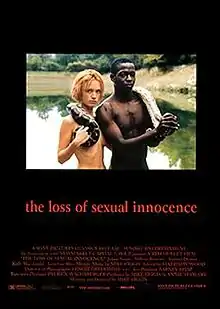The Loss of Sexual Innocence
The Loss of Sexual Innocence is a 1999 film written and directed by Mike Figgis.[3] It tells the story of the sexual development of a filmmaker through three stages of his life, in a non-linear and disjointed manner.[4] The film stars British actress Saffron Burrows,[3] whom Figgis dated for several years.[5]
| The Loss of Sexual Innocence | |
|---|---|
 Film poster | |
| Directed by | Mike Figgis |
| Produced by | Mike Figgis Annie Stewart Patrick Wachsberger |
| Written by | Mike Figgis |
| Starring | |
| Music by | Mike Figgis |
| Edited by | Matthew Wood |
| Distributed by | Summit Entertainment Sony Pictures Classics |
Release date | 28 May 1999 |
Running time | 106 minutes |
| Country | United States United Kingdom |
| Language | English |
| Budget | $3.5 million[1] |
| Box office | $400,000[2] |
Plot
The story at the center of the movie is the tumultuous life of Nic (Julian Sands), a British director beginning a new film project in Tunisia.
Cast
- Julian Sands as Adult Nic
- Jonathan Rhys Meyers as Nic, aged 16
- Saffron Burrows as English/Italian Twin
- Stefano Dionisi as Luca
- Kelly Macdonald as Susan
- Gina McKee as Susan's Mother
- Bernard Hill as Susan's Father
- Rossy de Palma as Blind Woman
- Justin Chadwick as Flash Man
- Femi Ogunbanjo as Adam
- Hanne Klintoe as Eve
Production
The Loss of Sexual Innocence was based on a script called “Short Stories,” which Figgis had written in 1982.[6] His original concept was to have been a multimedia show featuring film, live performance and music. The success of Leaving Las Vegas allowed him to finance the making of the nearly two-decades-old cinematic project.[7]
Reception
Stephen Holden of The New York Times wrote, "Those with no patience for avant-garde films will want to avoid The Loss of Sexual Innocence...Everyone else will find moments of surpassing beauty in this courageous, deeply flawed film." He was effusive in his praise for Figgis creating the film's atmosphere "through its mixture of music, beautiful outdoor cinematography and somber, silent acting." What he considered flaws were the Adam and Eve storyline and two scenes which he considered irrelevant involving an airport encounter between identical twins separated at birth and the humiliation of an obese 12-year-old Nic by a gym teacher.[8]
Like Holden, Roger Ebert delineated what type of movie it is by explaining it as "an 'art film,' which means it tries to do something more advanced than most commercial films (which tell stories simple enough for children, in images shocking enough for adults)." He rated it 3 1⁄2 stars out of 4, adding that it "plays like a musical composition, with themes drifting in and out, and dialogue used more for tone than speech....Not all of it works, but you play along, because it's rare to find a film this ambitious."[9]
Taking a more playful approach in his review, Jeff Millar of the Houston Chronicle came to a similar conclusion as Holden and Ebert and explained, "If you are an adventurous filmgoer, interested in technique, certainly go. If you like stories with 'stories,' which go from Point A to Point B with conflicts along the way, this film may be a little too atonal for you."[10]
Emanuel Levy of Variety was critical of the movie as commentary on Nic’s loss of innocence and the entire state of civilization, stating that "it’s in this intent that the film fails most conspicuously, giving Figgis’ skeptics the strongest ammunition to dismiss his work as pretentious and overreaching."[1] Desson Howe of The Washington Post was more scathing in his analysis and declared, "For me, at least, The Loss of Sexual Innocence is the highly cinematic equivalent of a smoke-and-mirrors job."[7]
References
- Levy, Emanuel. "The Loss of Sexual Innocence" (review), Variety, Tuesday, January 26, 1999. Retrieved October 26, 2020
- http://www.the-numbers.com/movie/Loss-of-Sexual-Innocence#tab=summary
- Figgis, Mike (January 7, 2000). "Hollywood Beyond". The Guardian.
- Plot summary of the film. IMDb.
- Cooper, Tim (May 5, 2002). "A hint of Saffron". The Guardian.
- Kaufman, Anthony. "Interview: Mike Figgis' Loss of Sexual Innocence," IndieWire, May 1999. Retrieved October 27, 2020
- Howe, Desson. "At a Loss With Sexual Innocence," The Washington Post, Friday, June 25, 1999. Retrieved October 27, 2020
- Holden, Stephen. "The Loss of Sexual Innocence: The Story of Adam and Eve, Sort Of," The New York Times, Friday, May 28, 1999. Retrieved October 26, 2020
- Ebert, Roger. "The Loss of Sexual Innocence" (review), RogerEbert.com, Friday, June 18, 1999. Retrieved October 26, 2020
- Millar, Jeff. "The Loss of Sexual Innocence" (review), Houston Chronicle, Friday, July 9, 1999. Retrieved October 27, 2020